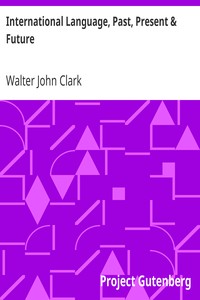International Language, Past, Present & Future by Walter John Clark
"International Language, Past, Present & Future" by Walter John Clark is a comprehensive examination discussing the necessity and practicality of an international auxiliary language, likely written in the early 20th century. The text thoroughly explores the economic, cultural, and political implications of adopting a universal language while presenting Esperanto as a viable solution to promote global communication and understanding. The opening of this work introduces the reader to the concept of an
international language, emphasizing two primary inquiries: its desirability and its feasibility. Clark discusses the rising need for a common linguistic framework as global interaction increases, detailing how current multilingual communication is both cumbersome and inefficient. He argues that an artificial but easy-to-learn language like Esperanto could significantly reduce barriers to communication, enhance international cooperation, and facilitate the exchange of ideas. Through a historical overview of previous attempts at universal languages, Clark sets the stage for his advocacy of Esperanto, highlighting its ongoing development and adoption by enthusiasts worldwide. (This is an automatically generated summary.)
Read or download for free
| How to read | Url | Size | |||
|---|---|---|---|---|---|
| Read now! | https://www.gutenberg.org/ebooks/16737.html.images | 624 kB | |||
| EPUB3 (E-readers incl. Send-to-Kindle) | https://www.gutenberg.org/ebooks/16737.epub3.images | 265 kB | |||
| EPUB (older E-readers) | https://www.gutenberg.org/ebooks/16737.epub.images | 273 kB | |||
| EPUB (no images, older E-readers) | https://www.gutenberg.org/ebooks/16737.epub.noimages | 256 kB | |||
| Kindle | https://www.gutenberg.org/ebooks/16737.kf8.images | 547 kB | |||
| older Kindles | https://www.gutenberg.org/ebooks/16737.kindle.images | 480 kB | |||
| Plain Text UTF-8 | https://www.gutenberg.org/ebooks/16737.txt.utf-8 | 430 kB | |||
| Download HTML (zip) | https://www.gutenberg.org/cache/epub/16737/pg16737-h.zip | 254 kB | |||
| There may be more files related to this item. | |||||
Similar Books
About this eBook
| Author | Clark, Walter John |
|---|---|
| Title |
International Language, Past, Present & Future With Specimens of Esperanto and Grammar |
| Credits |
Produced by Jonathan Ingram, William Patterson and the Online Distributed Proofreading Team at www.pgdp.net |
| Reading Level | Reading ease score: 60.9 (8th & 9th grade). Neither easy nor difficult to read. |
| Language | English |
| LoC Class | PM: Language and Literatures: Indigenous American and Artificial Languages |
| Subject | Language, Universal |
| Subject | Esperanto -- Grammar |
| Category | Text |
| EBook-No. | 16737 |
| Release Date | Sep 24, 2005 |
| Most Recently Updated | Dec 12, 2020 |
| Copyright Status | Public domain in the USA. |
| Downloads | 556 downloads in the last 30 days. |
| Project Gutenberg eBooks are always free! | |

